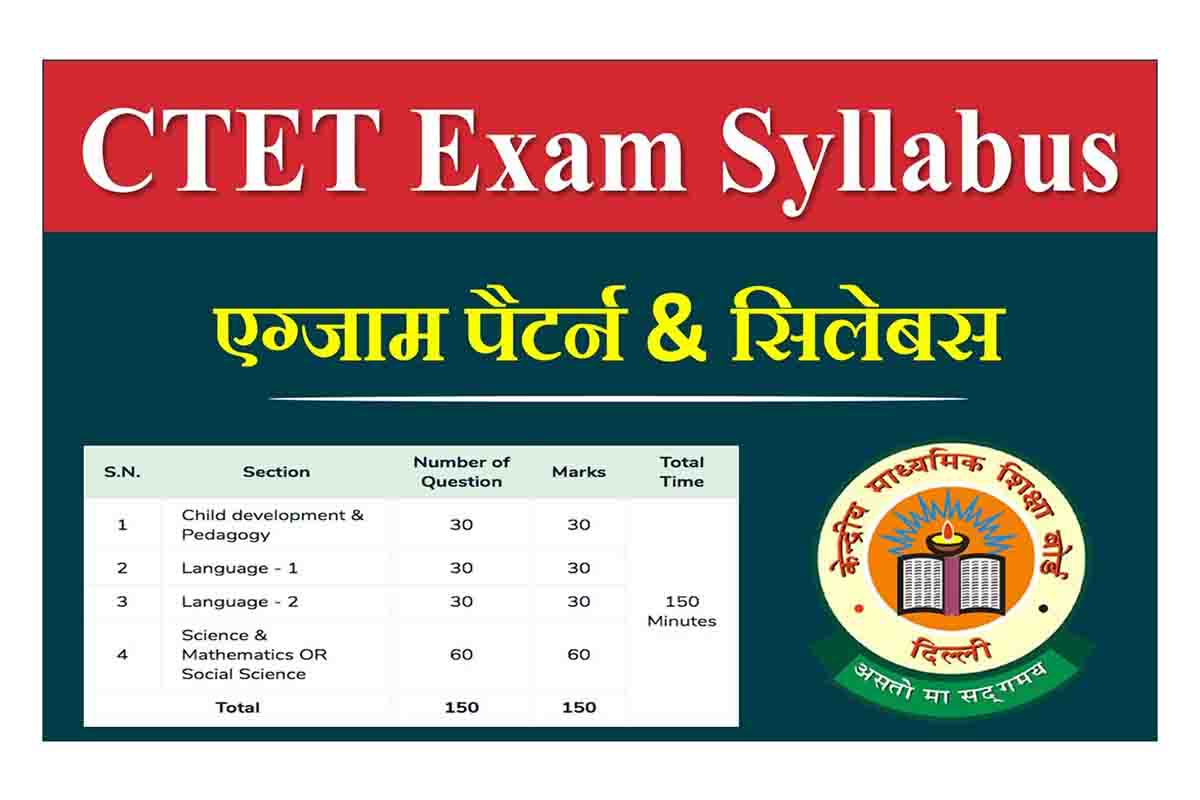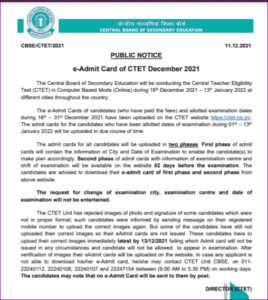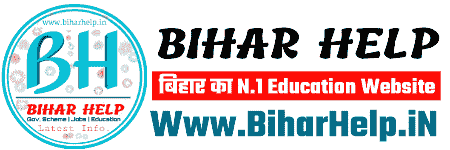CTET Paper 1 Syllabus 2022: यदि आप भी केंद्रीय शिक्षक पात्रता परीक्षा अर्थात् CTET की परीक्षा मे बैठने वाले है इस बात को लेकर परेशान है कि, क्या पढ़े और क्या छोड़े तो हमारा यह आर्टिकल आपके लिए बेहद उपयोगी व महत्वपूर्ण है क्योंकि इस आर्टिकल म, हम आपको विस्तार से CTET Paper 1 Syllabus 2022 के बारे मे बतायेगे जिसके लिए आपको हमारे साथ बने रहना होगा।

आपको बता दें कि, CTET Paper 1 Syllabus 2022 के तहत आप सभी परीक्षार्थियो को ऑनलाइन मोड मे, परीक्षा देनी होगी जिसमे आपको कुल 150 बहु – विकल्प सवालो के जबाव देने होंगे जो कि, कुल 150 अंको का होगा और आपकी सुविधा के लिए हम आपको पूरी परीक्षा पैर्टन के बारे में भी बतायेगे ताकि आप सभी इसका पूरा – पूरा लाभ प्राप्त कर सकें।
अन्त, आर्टिकल के अन्त मे, हम आपको क्विक लिंक्स भी प्रदान करेगे ताकि आप सभी इसका पूरा – पूरा लाभ प्राप्त कर सकें।

Read Also – Simultala Awasiya Vidyalaya Class 11 Admission 2022-24: Online Forms, Dates, Eligibility
CTET Paper 1 Syllabus 2022 : Overview
| Name of the Testing Agency | CENTRAL BOARD OF SECONDARY EDUCATION |
| Name of the Test | केंद्रीय शिक्षक पात्रता परीक्षा
Central Teacher Eligibility Test (CTET)
|
| Name of the Article | CTET Paper 1 Syllabus 2022 |
| Type of Article | Syllabus |
| Mode of Exam | Online |
| No of Papers | Paper 1 and Paper 2 |
| CTET Paper 1 Syllabus 2022? | Mentioned In the Aricle |
| Official Website | Click Here |
A to Z Post Marmot of CTET Paper 1 Syllabus 2022?
आईए अब हम आप सभी अभ्यर्थियो व उम्मीदवारो को जो कि, केंद्रीय शिक्षक पात्रता परीक्षा के तहत पेपर 1 की परीक्षा देने वाले है उन्हें हम विस्तार से इस आर्टिकल की मदद से CTET Paper 1 Syllabus 2022 के बारे मे बतायेगे जो कि, इस प्रकार से हैं –

Read Also – Bihar Board inter Exam Form 2023 PDF Download Link – इंटर बोर्ड परीक्षा 2023 हेतु परीक्षा फॉर्म
Paper I (for classes 1 to V) Primary Stage
A. Child Development and Pedagogy
Child Development (Primary School Child) ( 15 Questions )
- Concept of development and its relationship with learning
- Principles of the development of children
- Influence of Heredity& Environment
- Socialization processes:Social world& children (Teacher,Parents,Peers)
- Piaget,Kohlberg andVygotsky:constructs and critical perspectives
- Concepts of child-centered and progressive education
- Critical perspective of the construct of Intelligence
- Multi-Dimensional Intelligence
- Language&Thought
- Gender as a social construct;genderroles, gender-bias and educational practice
- Individual differences among learners, understanding differences based on diversity of language, caste, gender, community,religion etc.
- Distinction between Assessment for learning and assessment of learning; School-Based Assessment, Continuous& ComprehensiveEvaluation:perspective and practice
- Formulating appropriate questions for assessing readiness levels of learners; for enhancing learning and critical thinking in the classroom and for assessing learner achievement.
ConceptofInclusive education and understanding childrenwith special needs
( 5 Questions )
- Addressing learners from diverse backgrounds including disadvantaged and deprived
- Addressing the needs of children with learning difficulties,„impairment‟etc.
- Addressing theTalented,Creative,Specially abled Learners
Learning and Pedagogy ( 10 Questions )
- How children think and learn; how and why children „fail‟ to achieve success in school performance.
- Basic processes of teaching and learning; children‟s strategies of learning; learning as a social activity;social context of learning.
- Child as a problem solver and a„scientific investigator‟
- Alternative conceptions of learning in children, understanding children‟s „errors‟ as significant steps in the learning process.
- Cognition & Emotions
- Motivation and learnin
- Factors contributing to learning – personal & environmental
B. Language I
Language Comprehension ( 15 Questions )
- Reading unseen passages – two passages one prose or drama and one poem with questions on comprehension, inference, grammar and verbal ability (Prose passage may be literary, scientific, narrative or discursive)
Pedagogy ofLanguage Development ( 15 Questions )
- Learning and acquisition
- Principles of languageTeaching
- Role of listening and speaking;function of language and how children use it as a tool
- Critical perspective on the role of grammar in learning a language for communicating ideas verbally and in written form
- Challenges of teaching language in a diverse classroom; language difficulties, errors and disorders
- LanguageSkills
- Evaluating language comprehension and proficiency: speaking, listening, reading and writing
- Teaching- learning materials: Textbook, multi-media materials, multilingual resource of the classroom
- RemedialTeaching etc.
C. Language -II
Comprehension ( 15 Questions )
- Two unseen prose passages (discursive or literary or narrative or scientific) with question on comprehension, grammar and verbal ability
Pedagogy ofLanguage Development ( 15 Questions )
- Learning and acquisition
- Principles of languageTeaching
- Role of listening and speaking;function of language and how children use it as a tool
- Critical perspective on the role of grammar in learning a language for communicating ideas verbally and in written form;
- Challenges of teaching language in a diverse classroom; language difficulties, errors and disorders
- LanguageSkills
- Evaluating language comprehension and proficiency: speaking, listening, reading and writing
- Teaching – learning materials:Textbook, multi-media materials, multilingual resource of the classroom
- RemedialTeaching
D. Mathematics
Content ( 15 Questions )
- Geometry
- Shapes & Spatial Understanding
- Solids around Us
- Numbers
- Addition andSubtraction
- Multiplication
- Division
- Measurement
- Weight
- Time
- Volume
- Data Handling
- Patterns
- Money
Pedagogical issues ( 15 Questions )
- Nature of Mathematics/Logical thinking; understanding children‟s thinking and reasoning patterns and strategies of making meaning and learning
- Place of Mathematics in Curriculum
- Language of Mathematics
- Community Mathematics
- Evaluation through formal and informal methods
- Problems ofTeaching
- Error analysis and related aspects of learning and teaching
- Diagnostic and RemedialTeaching
E. Environmental Studies
Content ( 15 Questions )
- Family and Friends : Relationships
- Workand Play
- Animals
Plants
ii. Food
iii. Shelter
iv. Water
v. Travel
vi. ThingsWe Make and Do
Pedagogical Issues ( 15 Questions )
- Concept and scope ofEVS
- Significance of EVS, integrated EVS
- Environmental Studies & Environmental Education
- Learning Principles
- Scope & relation to Science & SocialScience
- Approaches of presenting concepts
- Activities
- Experimentation / Practical Work
- Discussion
- CCE
- Teaching material/Aids
- Problems Etc.
इस प्रकार हमने आपको केंद्रीय शिक्षक पात्रता परीक्षा के तहत होने वाले पेपर 1 के पूरे पाठ्यक्रम का विश्लेषण प्रस्तुत किया ताकि आप सभी इसके अनुसार, अपनी – अपनी परीक्षा की तैयारी कर सके और इसका लाभ प्राप्तक कर सकें।
Latest Blue Print of Exam Pattern of CTET Paper 1 Syllabus 2022?
| Paper I (for Classes I to V) Primary Stage; Duration of examination-Two-and-a-half hours Structure and Content (All Compulsory): (Appendix I) | |
| Subjects | Total Questionsl and Marks |
| Child Development and Pedagogy (compulsory | Total Questions
Total Marks
|
| Language I (compulsory) | Total Questions
Total Marks
|
| Language II (compulsory) | Total Questions
Total Marks
|
| Mathematics | Total Questions
Total Marks
|
| Environmental Studies | Total Questions
Total Marks
|
| Total | Total Questions
Total Marks
|
सारांश
इस प्रकार हमने अपने सभी अभ्यर्थियो व परीक्षार्थियो को विस्तार से CTET Paper 1 Syllabus 2022 के साथ ही साथ पेपर पैर्टन के बारे मे बताया ताकि आप सभी अपनी – अपनी परीक्षा की तैयारी पुख्ता तौर पर कर सके और इसका लाभ प्राप्त कर सकें।
अन्त, हमे उम्मीद है आप सभी परीक्षार्थियो को हमारा यह आर्टिकल बेहद पसंद आया होगा जिसके लिए आप हमारे इस आर्टिकल को लाइक, शेयर व कमेट करेगे।
क्विक लिंक्स
| Official Website | Click Here |
| Join Our Telegram Group | Click Here |
FAQ’s – CTET Paper 1 Syllabus 2022
What are the subjects in CTET Paper 1?
Paper 1 comprises 5 sections namely, Child Development and Pedagogy, Language 1, Language 2, Mathematics and Environmental Studies. Paper 2 has four sections namely Child Development and Pedagogy, Language 1, Language 2, Mathematics & Science OR Social Studies. Ques: Is language 1 and 2 compulsory in CTET 2022?
What is the syllabus for CTET exam 2022?
UET Syllabus 2022 for Domain SECTION Code Name Section II: Domain (27 Domain Specific Subjects) 315 Home Science 316 Knowledge Tradition-Practices India 317 Legal Studies 318 Mass Media/Mass Communication
